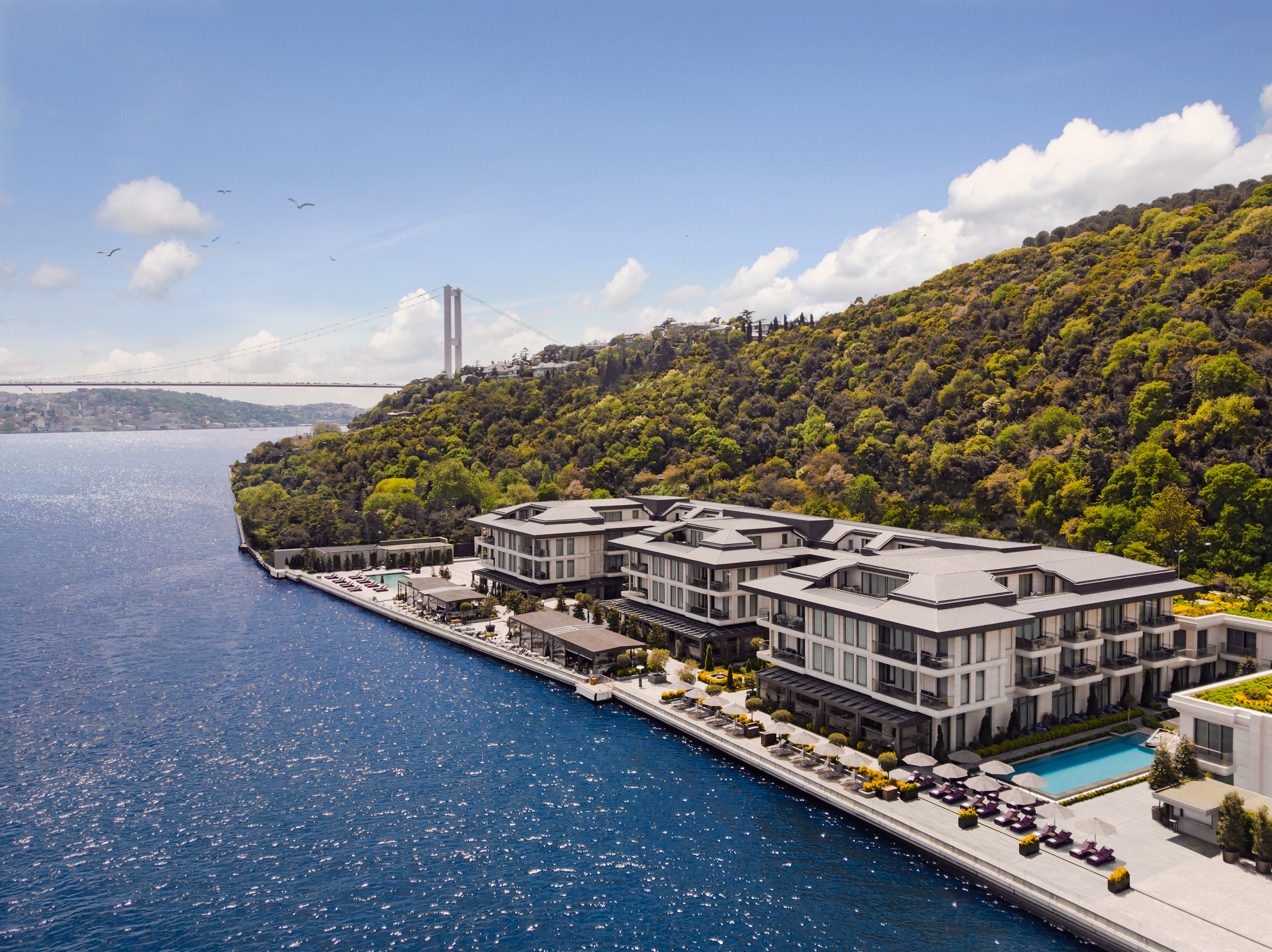Mandarin Oriental Bosphorus is an enticing blend of contemporary luxury and old-world charm
Words: Will Moffitt
During my three nights stay in Istanbul, I hear the phrase “to Bosphorise” a handful of times. The term belies formal definition – several internet searches have left me none the wiser – but it seems to denote both an activity and a state of mind: an impulse to laze by the side of the Bosporus and absorb the character of this ancient waterway.
Marrying the Black Sea and the Sea of Marmara, and the Dardanelles, this strait – dotted with palaces, ruins, and old Ottoman houses (known as yalis) – has seen kings and sultans come and go; empires rise and fall; industrialisation and modernity disrupt centuries-old traditions. Yet its magnetic charm has never wavered and Mandarin Oriental Bosphorus, located on the side of those banks, is a place to savour that shimmering magic.
Numbering 100 rooms, including 23 luxurious suites, and neighbouring grand old buildings – the decadent Beylerbeyi Palace; and the steeple topped Kuleli Military School – the hotel’s angular, imposing frame takes inspiration from those houses and palaces nearby, with its large windows giving a panoramic view of the strait. The lobby, a sleek blend of black marble pillars and dangling chandeliers, is the centrepiece of an aesthetic dreamt up by hospitality design guru Adam Tihany. Slanted facades, mesh panels and a recurring tulip motif – a timeless symbol of Istanbul – feature throughout, offering a modern spin on the city’s rich and layered history.
The rooms, understated but elegant, carry this aesthetic too, with wood coverings, panels, marble bathrooms and tulip-shaped lights. The hotel’s 23 suites are significantly more lavish, offering unparalleled waterfront views, personalised bars and gym facilities. The Naile Sultan Bosphorus suite is a popular destination for kings, senior diplomats, and political leaders, while The Royal Bosphorus Suite is billed as the most impressive suite in Istanbul. With a grand terrace, winter garden and a palatial living space overlooking the Bosphorus, it’s a claim few would challenge.
The Mandarin’s two restaurants – a Hakkasan will soon make three – honour the city's bridge between East and West. Olea celebrates wholesome Italian classics and has the largest Italian wine cellar in the city. Meanwhile, Novikov Istanbul delivers delicious Pan-Asian morsels and brings a streak of Mayfair’s Berkeley Street glamour to this side of the Bosphorus.

Above: Novikov Istanbul brings Pan-Asian delights and glamour to the Bosphorus
Situated in Istanbul’s Kuruçeşme neighbourhood, the hotel is a short walk from Kuruçeşme’s historic streets, its ancient churches, and Ortaköy Mosque which – like much of this city – is a wonder of diverse cultural elements and influences. In this case European neoclassicism and Ottoman Baroque. Ideal for tourists, the hotel is a short commute away from the city’s Taksim Square and central business district and close to Bebek, a trendy upmarket neighbourhood known for its strong selection of local shops and restaurants.
Venture further into this sprawling metropolis and you will unearth a city of overlapping histories, cultures, religions, and beautiful contradictions. From Hagia Sophia, the ancient Byzantine church constructed in the 6th century (now a mosque, where minarets and Arabic inscriptions and Christian mosaics reside) to the Suleymaniye mosque, crafted by Turkish architect Mimar Sinan – a contemporary of Michelangelo’s – into a symbol of Ottoman imperial superiority, Istanbul’s buildings are testament to its rich, multi-layered history.
Signs of that storied past can be found in the now crumbled remains of the Hippodrome in Sultanahmet Park, where Byzantine chariot races once enthralled emperors and baying crowds; or the ancient Ionic and Corinthian columns of the Basilica Cistern, built by Emperor Justinian I to house vast quantities of water. Explore the 61 maze-like streets of the Grand Bazaar, one of the largest and oldest covered markets in the world, where artisans ply centuries-old trades; or Nakkaş Hali, home to more than 20,000 carpets and kilims, including antique rugs and modern designs created with traditional Turkish weaving techniques.
Following a long day wandering through this enchanting city, head back to the Mandarin for a hammam (Turkish bath), or to try one of the hotel’s myriad spa, beauty, and wellness programmes. Once a fundamental part of early hygiene and ritualistic cleansing exercises – archaeological remains suggest that Islamic bathhouses go as far back as the 7th – 8th centuries – it's a soothing way to calm stress and reflect on the events of the day.
Afterwards, head to the hotel bar and get another view of that glimmering shoreline as it glows with the neon silhouettes of passing boats and ferries. As the famous Turkish novelist Orhan Pamuk wrote in his memoir, Istanbul: Memories and the City: “Life can't be all that bad… Whatever happens, I can always take a long walk along the Bosphorus.”
A single Mandarin Bosphorus View Room is €1.835 per night, including breakfast. For flights visit: www.turkishairlines.com





